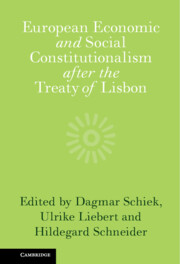Book contents
- Frontmatter
- Contents
- Contributors
- Preface
- Abbreviations
- Table of cases
- Introduction
- Part I European economic and social constitutionalism between norms and practices
- Part II Emanations of tensions between economic and social integration
- Part III Studying cases of possible tensions
- 8 Civic integration of immigrants
- 9 Corporate social responsibility
- 10 Services of general interest provision through the third sector under EU competition law constraints
- Bibliography
- Index
9 - Corporate social responsibility
Assessing the scope for an EU policy
from Part III - Studying cases of possible tensions
Published online by Cambridge University Press: 05 July 2011
- Frontmatter
- Contents
- Contributors
- Preface
- Abbreviations
- Table of cases
- Introduction
- Part I European economic and social constitutionalism between norms and practices
- Part II Emanations of tensions between economic and social integration
- Part III Studying cases of possible tensions
- 8 Civic integration of immigrants
- 9 Corporate social responsibility
- 10 Services of general interest provision through the third sector under EU competition law constraints
- Bibliography
- Index
Summary
Introduction
When I give food to the poor, they call me a saint. When I ask why the poor have no food, they call me a communist.
While the asymmetry of the economic and social dimension of the European integration project has been thoroughly analysed and documented, it remains open as to what could and should be done to achieve a more balanced integration process. In particular, it is disputed whether related efforts should focus on the national or supranational level and whether these efforts should be of a regulatory or soft-law nature. With regulation having become more difficult after the Eastern enlargement rounds, considerable attention has been directed towards so-called new modes of governance, in particular the open method of co-ordination (OMC). Another instrument that emerged on the EU agenda in the context of the Lisbon Strategy in 2000 is ‘corporate social responsibility’ (CSR). The aim of CSR is to call upon firms’ sense of responsibility to contribute to certain social standards, to social cohesion, to environmental awareness or sustainable development. CSR could thus be seen as an attempt to balance the economic and social dimensions of the European integration project. This chapter asks, in an explorative way, in how far a European CSR policy that would work in favour of the social dimension is possible in light of the institutional differences between Member States.
- Type
- Chapter
- Information
- Publisher: Cambridge University PressPrint publication year: 2011
- 1
- Cited by



